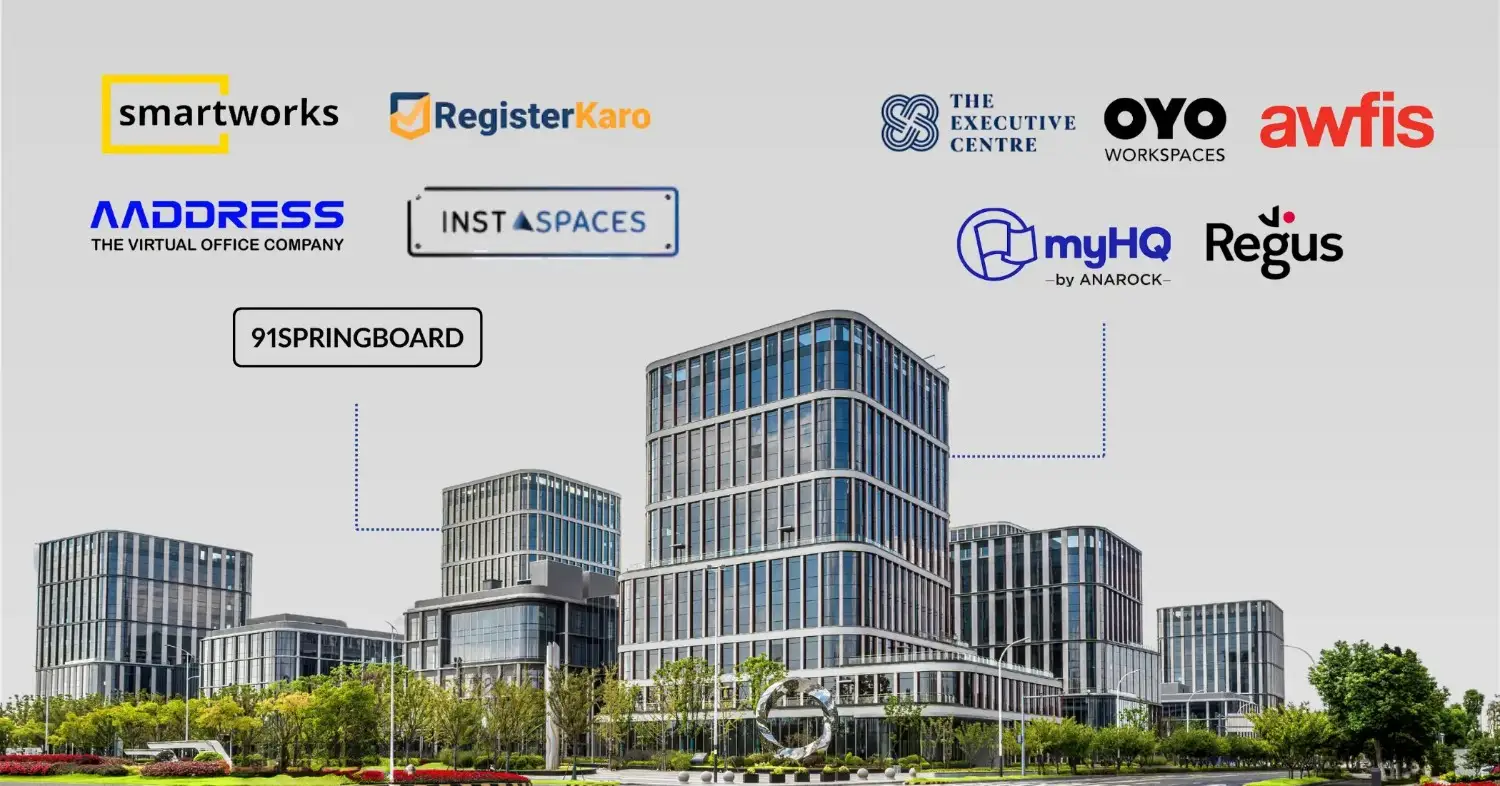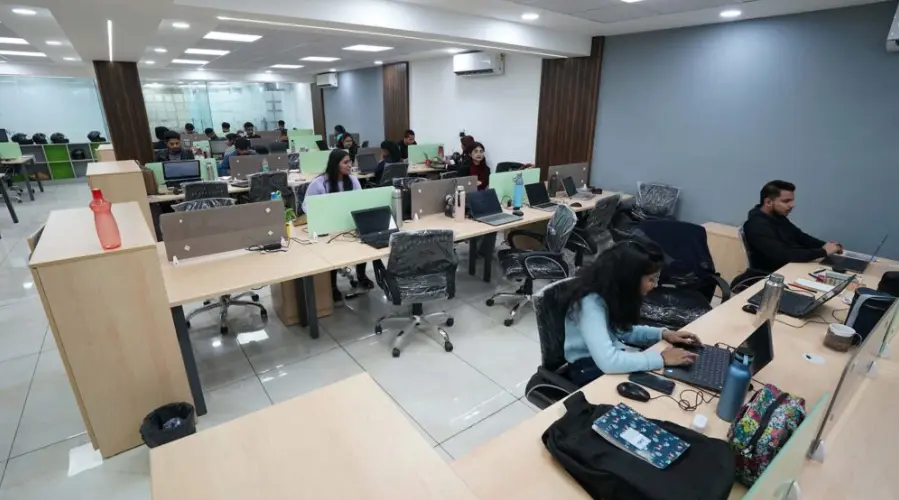
Picture this: you’re building a business from scratch. Your ideas are big, but your budget isn’t. Renting a fancy office in a prime location feels impossible, yet you want your business to be taken seriously. This is where a virtual office comes in, a smart solution that provides a professional address, mail handling, call answering, and even access to meeting rooms, all without the overhead of a physical office.
Virtual office plans in India are flexible, starting from around ₹999 per month for basic services, and going up to ₹5,000–₹10,000 per month for premium options with added features like dedicated calls and meeting room access. This makes them ideal for freelancers, startups, and growing enterprises who want to look established while staying lean.
Despite their growing popularity, virtual offices are often misunderstood. Some assume they’re “just a mailbox,” while others question their credibility. In reality, they are a legitimate way to operate professionally, scale efficiently, and reduce costs, especially in today’s remote-first world.
In India, virtual office addresses can also be legally used for GST registration, company incorporation, and business correspondence, as long as the provider is authorized and issues proper NOCs/agreements. Businesses can ensure compliance and legitimacy by setting up a virtual office with an authorized provider.
In this blog, we debunk eight common myths about virtual offices to help you decide if it’s right for your business.

Myth #1: Virtual Offices Are Too Expensive
A common belief is that virtual offices are costly and not practical for small businesses or freelancers. Many people assume this without actually looking at the savings they offer. In reality, the cost of a virtual office depends on the services you choose, such as a professional business address, mail and courier handling, call answering, or access to meeting rooms. You can easily pick a plan that fits your budget without paying for things you don’t need.
For example, if you take a virtual office in Bangalore or any other city, the charges are based on the services included in your package, making it flexible and customizable.
Fact: Virtual offices are far more affordable than renting or maintaining a traditional office. You save big on rent, electricity, furniture, and maintenance while still enjoying the credibility of a prime business address. On top of that, you get essential services like mail handling and professional communication included in the cost.
This makes virtual offices not just cost-effective but also a smart choice for businesses that want flexibility and professionalism without hidden overheads.
Myth #2: All Virtual Offices Are the Same
One of the most common myths about virtual offices is that they all offer the same experience and services. But this isn’t true. Virtual offices can differ widely in terms of features, locations, and additional services. What you get depends on the provider and the plan you choose, so it’s important to select a virtual office that matches your business needs.
Virtual office providers typically offer tiered packages to cater to different business requirements. Here’s a breakdown of common plans and their features:
- Business Address Plan: ₹1,000–₹2,000/month
Ideal for businesses needing a professional address without physical space.
- GST Registration Plan: ₹1,300–₹2,000/month
Includes address and documentation support for GST registration.
- Company Registration Plan: ₹1,500–₹2,700/month
Covers compliance documents and assistance with new company incorporation.
- Premium/All-Inclusive Packages: ₹3,000–₹6,000/month or ₹10,000–₹25,000 annually
These packages typically combine address, mail handling, call answering, and meeting room usage.
When choosing a virtual office, consider the specific services you require and select a plan that aligns with your business objectives.
Fact: Virtual offices come with different features and setups depending on the location and provider. For example, a virtual office in Delhi may offer premium business addresses with dedicated call handling, while virtual offices in Mumbai might provide access to meeting rooms and coworking desks. In Chennai or Pune, providers may focus more on mail and courier services for startups and consultants. You can even customize your virtual office plan to include only the services you need, creating a setup that perfectly suits your business and helps you stand out professionally.
Explore RegisterKaro’s virtual office plans today, compare packages, and select the one that fits your business requirements. Get started with a credible, cost-effective office solution without the overhead of a traditional setup.
Myth #3: Virtual Offices Are Unprofessional and Distracting
Another common myth is that virtual offices are not professional enough and can be distracting since you’re not working in a traditional office setup. Many people assume that without a fixed desk or a physical workplace, it’s impossible to focus or maintain credibility. But that’s not true.
A virtual office is designed to provide a business with all the professional essentials, like a registered address without the daily noise or interruptions of a shared office space.
In fact, virtual offices often help boost productivity because your employees can work from wherever they’re most comfortable, whether at home, in a café, or while traveling, while still maintaining a professional image for clients. They get the flexibility to work in silence if they prefer, yet can use office facilities like meeting rooms whenever a professional environment is needed.
Fact: A study by IWG (International Workplace Group) revealed that 70% of professionals worldwide work remotely at least one day a week. Many of these professionals use virtual offices to maintain a credible presence while enjoying flexible working.
This proves that virtual offices support professionalism and productivity rather than distract from it.
Myth #4: Virtual Offices Are Only for Startups and Freelancers
There is a common myth among business owners that virtual offices are useful only for startups, freelancers, or solopreneurs. Many assume that bigger companies or growing teams can’t benefit from them, so they invest heavily in traditional office spaces instead. While having a physical office has its own pros and cons, the idea that virtual offices are limited to small businesses isn’t true at all.
Virtual offices are a practical option for businesses of every size, whether you’re just starting or running an established company looking to expand into new markets.
In fact, if you want to understand the key differences between virtual offices and traditional offices, you can read our detailed blog.
Fact: Virtual offices are not limited to any specific type of business. For instance, many IT firms like Cognizant allow hybrid work setups and use virtual offices to support employee flexibility, consultants in Pune rely on them for smooth client communication, and even multinational companies in Delhi NCR or Chennai use virtual offices to test new markets before setting up a branch.
From startups to large enterprises, virtual offices offer flexibility, professional services, and cost savings, making them a smart solution for businesses of all scales.
Myth #5: Virtual Offices Are Only for Short-Term Use
How many times have you heard people say, “Virtual offices are just a short-term solution”? Probably quite often. Many assume that virtual offices are a passing trend that businesses will quickly abandon now that the COVID-19 pandemic is over. However, this isn’t true. Major companies and even global startups are increasingly using virtual offices to maintain a professional presence while expanding into new cities or states without committing to long-term leases.
Fact: Virtual offices are becoming a long-term business solution. For example, startups in Gurgaon use virtual offices to establish credibility while they scale, consultants in Kolkata rely on them for professional communication with clients, and expanding companies like Infosys in Bangalore and Chennai use virtual offices to explore new markets before opening physical branches.
Myth #6: Virtual Offices Don’t Allow Businesses to Grow
Many business owners think that virtual offices limit growth and don’t support expanding teams. They assume that without a physical office, their company and employees can’t scale properly. However, this is a myth.
Virtual offices are designed to grow with your business. You can easily add new services, upgrade your plan, or expand your presence to multiple locations without any constraints.
Fact: Virtual offices provide flexibility that supports business growth. You can add more services or locations as your team or client base grows. For instance, companies in Hyderabad can start with a single virtual office address and later add locations in Delhi NCR or Chennai as they expand.
Similarly, consultants in Pune and Kolkata can upgrade their virtual office plans to include additional mail handling, call services, or meeting rooms as needed. This flexibility allows businesses to scale efficiently while maintaining a professional image across multiple cities.
Myth #7: Virtual Offices Are the Same as Renting a Regular Office
Some business owners think that using a virtual office is the same as renting a traditional office space. While both give your business a professional address, virtual offices offer far more flexibility and modern solutions compared to conventional offices.

Fact: The main difference is that with a traditional office, you usually only get the space itself; you still have to pay extra for utilities, furniture, IT infrastructure, and maintenance. In contrast, virtual offices come with essential professional services included.
For example, virtual offices across major cities provide:
- Delhi: Business addresses with mail handling and call answering
- Mumbai: Access to meeting rooms and coworking desks
- Chennai & Pune: IT support, high-speed Wi-Fi, and professional communication services
This means your business can operate professionally and efficiently without the extra costs and long-term commitments of a traditional office.
Myth #8: Virtual Offices Are Just Shared Office Spaces
Many business owners think that virtual offices are the same as shared office spaces. This is a common myth because both terms involve multiple businesses using the same services, which can sound confusing at first. However, virtual offices are quite different from shared office setups.
Fact: Unlike shared offices, where employees from different companies work side by side and share furniture, lounges, or cafeterias, virtual offices provide professional services without requiring you to occupy a physical workspace.
For example, a virtual office in Mumbai can give your business a prime address with mail handling and call services, while in Hyderabad, it might include access to meeting rooms and administrative support. This setup ensures flexibility, cost savings, and professional credibility, without the need for a traditional shared office environment.
How to Choose the Right Virtual Office Provider in India?
Choosing the right virtual office provider is crucial for ensuring your business operates professionally, efficiently, and cost-effectively. With multiple providers and plans available, it’s important to evaluate key factors before making a decision. Here are the main considerations:
- Prestigious Business Address: A virtual office should provide a professional address in a prime location. This helps build credibility and trust with clients, partners, and stakeholders. Locations in business hubs like central business districts or well-known commercial areas add a sense of establishment to your brand.
- Mail Handling Services: Efficient mail management is essential. Look for providers that handle incoming and outgoing mail, offer scanning and forwarding options, and ensure secure storage. Proper mail handling supports smooth business operations even without a physical office.
- Call Answering & Reception Support: Professional call answering and receptionist support are important for maintaining a credible image. A dedicated phone line with trained staff ensures client queries, appointments, and messages are handled promptly, giving your business a professional and organized front.
- Access to Meeting Rooms & Workspace: A quality virtual office should provide access to meeting rooms, coworking spaces, or event facilities when needed. This allows teams to host client meetings, interviews, or presentations without maintaining a full-time physical office.
- Transparent Pricing & Flexible Contracts: Always review the services included in a package and be aware of any extra charges. Flexible contract terms, clear pricing, and easy upgrades or downgrades allow businesses to scale efficiently while keeping costs under control.
- Reputation and Reliability: Research client reviews and testimonials to gauge service quality. A reliable provider will be responsive, professional, and consistent in delivering services. Trustworthy providers ensure your business operations run smoothly and maintain credibility in the market.
By evaluating these factors, businesses can choose a virtual office provider that meets their needs, supports growth, and provides a professional presence without the heavy costs and commitments of a traditional office.
Conclusion
From startups to large enterprises, virtual offices offer flexibility, professional services, and cost savings, making them a smart choice for businesses of all sizes. Contrary to common myths, they are cost-effective, credible, and support productivity while providing prime addresses, mail handling, call answering, and meeting room access, without the high costs of traditional offices.
The key is to choose a virtual office based on your business needs. Whether expanding into new markets, reducing overheads, or establishing a professional presence, a virtual office can be a game-changer.
RegisterKaro offers trusted virtual office solutions across major Indian cities, with flexible plans, transparent pricing, and full professional support. Connect with RegisterKaro today to compare plans and choose the right package for your business.
Frequently Asked Questions
A: Common myths include that virtual offices are too costly, unprofessional, or only for startups and freelancers. In reality, they are more cost-effective than traditional offices, offering prime addresses, mail handling, call answering, and meeting rooms. Even large companies in cities like Delhi, Mumbai, and Bangalore use virtual offices to maintain credibility and expand into new markets, making them a trusted solution for businesses of all sizes.




